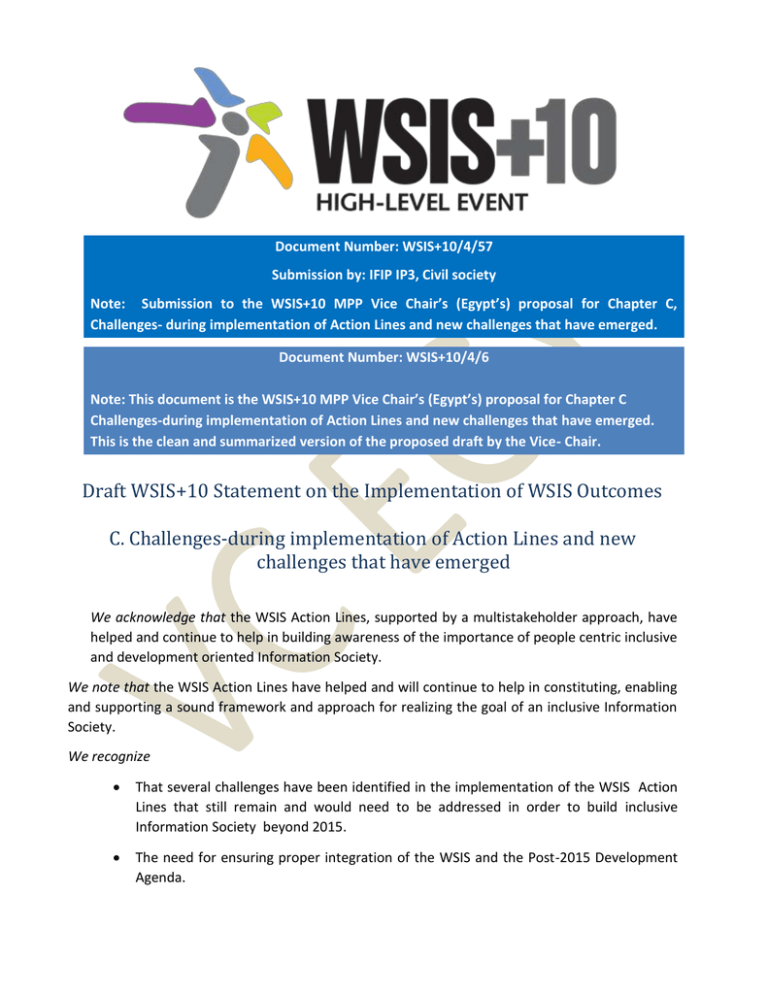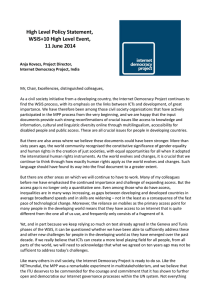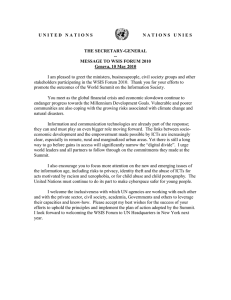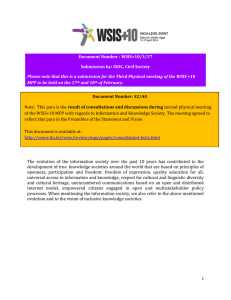Document 13472132
advertisement

Document Number: WSIS+10/4/57 Submission by: IFIP IP3, Civil society Note: Submission to the WSIS+10 MPP Vice Chair’s (Egypt’s) proposal for Chapter C, Challenges- during implementation of Action Lines and new challenges that have emerged. Document Number: WSIS+10/4/6 Note: This document is the WSIS+10 MPP Vice Chair’s (Egypt’s) proposal for Chapter C Challenges-during implementation of Action Lines and new challenges that have emerged. This is the clean and summarized version of the proposed draft by the Vice- Chair. Draft WSIS+10 Statement on the Implementation of WSIS Outcomes C. Challenges-during implementation of Action Lines and new challenges that have emerged We acknowledge that the WSIS Action Lines, supported by a multistakeholder approach, have helped and continue to help in building awareness of the importance of people centric inclusive and development oriented Information Society. We note that the WSIS Action Lines have helped and will continue to help in constituting, enabling and supporting a sound framework and approach for realizing the goal of an inclusive Information Society. We recognize That several challenges have been identified in the implementation of the WSIS Action Lines that still remain and would need to be addressed in order to build inclusive Information Society beyond 2015. The need for ensuring proper integration of the WSIS and the Post-2015 Development Agenda. We further recognize the following challenges that have emerged in the implementation of Action Lines and new challenges beyond 2015: 1. The need to protect and reinforce human rights, as referred to in the Preamble, and to recognize their importance to realize economic and social development, ensuring equal respect for and enforcement of human rights online and offline. 2. The need to promote and ensure the safety of online journalists, including citizen journalists, human right defenders and their freedom of expression in accordance with the principles cited in the Preamble and subject to national laws and legislation. 3. The need to fully integrate gender equality perspectives in WSIS related strategies and facilitate their implementation as referred to in the Preamble to ensure that the Information Society enables women’s empowerment and full participation on the basis of equality in all spheres of society and in all decision-making processes. 4. The need for more engagement of youth and enhancement of their participation in the WSIS process, to facilitate their inclusion and to strengthen their role in the Information Society development at the national, regional and international levels as referred to in the Preamble. 5. The need for continued extension of access for people with disabilities and vulnerable people to ICTs, especially in developing countries and among marginalized communities, taking into account the commitments mentioned within the preamble. 6. More than half of the world’s population is still not connected to the Internet, and the information and communication infrastructure development needs to continue, especially in rural and remote areas. 7. The need for further improving management and use of radio-frequency spectrum/satellite orbits for facilitating development and deployment of low-cost telecommunication networks, including satellite networks for all countries, taking into account special needs of developing and less developed countries. These are implemented through application and in accordance with ITU Radio Regulations. 8. That greater efforts are still required to improve affordable access to ICTs for all citizens, in particular in the developing countries and LDCs. There is also a need to ensure equity of access, including public access, in terms of human capacities and access to current and new ICTs technologies, between urban and rural communities within countries and between countries. 9. The deployment of broadband networks are still needed as a set of transformative technologies to achieve the sustainable development agenda beyond 2015 and to avail all kind of electronic services and new technologies required for citizens’ empowerment and wellbeing that are still not available for the majority of the world’s population. 10. The Internet and ICTs have become vitally important drivers for economic growth and development, and have stimulated innovation and new business opportunities. Accordingly, it has become important to ensure that trade policy and regulatory mechanisms enable Small and Medium-sized Enterprises to benefit from the economic potential of the Internet and other ICTs, and that such mechanisms do not create unnecessary barriers to new crossborder business opportunities. 11. The need for further developing the openness and multi-stakeholder character of the Internet development which has underpinned the remarkable growth to date; maintaining free access of the Internet for all citizens, ensuring its innovative capabilities and capacities for development, which drive economic and social wellbeing amongst peoples of the World; and reaching consensus on how to enhance cooperation among all stakeholders on issues related to Internet, but not the day to day technical issues. 12. The need for education that builds ICT skills to respond to the specific human and market needs and ICT-skilled and -knowledgeable teachers and learners on all educational levels to ensure genuine lifelong learning opportunities for all, with national educational programs. In addition to promoting innovative approaches for distance education and for open education resource (OER) content and applications. 13. The need to identify and develop best practices to build confidence and security in the use of ICTs while considering the importance of developing international cooperation using multi-stakeholder approaches. 14. The need to strengthen the continued development of appropriate network security and privacy, and continue to support capacity building and coordination on incident response and to encourage the creation of national and regional centers for incidents in computing security, in accordance with applicable national and international law. 15. The need to increase the global, regional and national awareness of the relevance of WSIS Process to national economic development-related strategies, policies and initiatives and the positive role it could play in their development. 16. The need to improve policies, including policy coherence across key information society sectors and reduce the skills gap between rich and poor within the same country, between countries, and between regions. 17. The need to continue to set realistic goals and decisive actions to reduce the gap between developed and developing countries in terms of technology. 18. The need to encourage multi-stakeholder approaches in policy development and decisionmaking at the national, regional, and international levels as referred to in the Preamble. 19. Policy frameworks and other initiatives, including establishment of IXPs, and other measures are required to address the digital divide that drive economic development and social wellbeing, especially in developing and least developed countries. 20. The need to enable the legal, regulatory and policy environment, including multistakeholder approaches, as appropriate at the national, regional, and international levels to continue to promote best access to ICT, investment and infrastructure and foster entrepreneurship and innovation. 21. The need to enable appropriate process, including multistakeholder approaches, where applicable to develop the necessary legal, regulatory and policy frameworks at the national, regional, and international levels to continue to promote best access to ICT, investment and infrastructure, foster entrepreneurship and innovation. 22. The need to ensure environmental sustainability to avoid any harmful outcomes that may result from the disposal of massive e-waste. 23. The need for policies that support and respect, preservation, promotion and enhancement of cultural and linguistic diversity, cultural heritage and diversity of tradition, and religious beliefs and convictions, within the Information and knowledge societies, to encourage the development of local language content online and promotion of language technologies in minority languages. 24. The need for citizens to have media and information literacy skills that are indispensable in order to fully participate in an inclusive Information Society. 25. Convergence of mass and social media lead to a need of rethinking the enabling environment and self-regulation of media to maintain its social responsibility, objectivity, freedom, independence and pluralism taking into consideration national laws. 26. The need to encourage the development of a global online code of ethics and recognising that this is necessarily a long term goal, that an active commitment to the development of trustworthy professionals who provide, develop and maintain ICTs for the people of the world to use. In advancing a global response this would involve a regime of mutual recognition which in and of itself would be a powerful means of developing a common understanding of ethical considerations. 27. The need to enhance the financing mechanisms and sufficient investment in digital inclusion measures, taking into account innovative approaches to bring the benefits of ICT to all.



